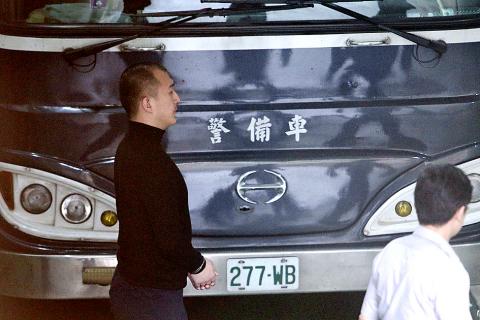The Taipei District Court yesterday convicted Chinese national Zhou Hongxu (周泓旭) of violating the National Security Act (國家安全法), handing him a 14-month prison sentence.
It was the first ruling on the case and Zhou can still appeal.
The judges found him guilty of spying for China and trying to entice Taiwanese government officials to give classified material for financial rewards.

Photo: CNA
In particular, prosecutors said that Zhou had offered US$10,000 to a Ministry of Foreign Affairs official to pass on classified government materials.
The judges gave Zhou what was considered a lenient sentence of 14 months, considering that “he had initially confessed to the crime” and that “he did not succeed in his espionage efforts.”
During the trial, Zhou rescinded his earlier confession and denied any involvement in espionage or recruitment, saying that he was coerced into making a false confession by investigators.
According to court documents, the 29-year-old, from Benxi in China’s Liaoning Province, was a student at Zhejiang University in Hangzhou.
He first came to Taiwan as an exchange student at Tamkang University in 2009, and in September 2012 enrolled in a master of business administration program at National Chengchi University. He graduated in July last year and returned to China the following month.
He returned to Taiwan in February as an executive for Taiwan Yong Ming International Co (台灣詠銘), which is registered in Taipei, but funded by a Hong Kong firm.
Zhou in 2014 attended a cross-strait conference in Shanghai, where a Chinese official surnamed Li (李) told Zhou about getting paid to “carry out tasks” while studying and working in Taiwan, investigators said.
Li told him how to become acquainted with Taiwanese politicians and to target people working in the military, police, intelligence and foreign affairs agencies, they said.
Zhou joined numerous social networks and attended functions to make friends in Taiwan, where he established a relationship with a Ministry of Foreign Affairs junior official, who he tried to convince to pass on information, investigators said.
In yesterday’s ruling, the judges said that Zhou had violated Article 2-1 of the National Security Act, which states: “People are prohibited from carrying on detection, collection, consignation or delivery of any confidential documents, pictures, information or articles, or developing an organization for official use of a foreign country or mainland China, for its militaries, party duties or other official organizations, or the institutions established and specified by the foresaid organizations, or the civil groups entrusted by the foresaid organizations.”

CHAOS: Iranians took to the streets playing celebratory music after reports of Khamenei’s death on Saturday, while mourners also gathered in Tehran yesterday Iranian Supreme Leader Ayatollah Ali Khamenei was killed in a major attack on Iran launched by Israel and the US, throwing the future of the Islamic republic into doubt and raising the risk of regional instability. Iranian state television and the state-run IRNA news agency announced the 86-year-old’s death early yesterday. US President Donald Trump said it gave Iranians their “greatest chance” to “take back” their country. The announcements came after a joint US and Israeli aerial bombardment that targeted Iranian military and governmental sites. Trump said the “heavy and pinpoint bombing” would continue through the week or as long

TRUST: The KMT said it respected the US’ timing and considerations, and hoped it would continue to honor its commitments to helping Taiwan bolster its defenses and deterrence US President Donald Trump is delaying a multibillion-dollar arms sale to Taiwan to ensure his visit to Beijing is successful, a New York Times report said. The weapons sales package has stalled in the US Department of State, the report said, citing US officials it did not identify. The White House has told agencies not to push forward ahead of Trump’s meeting with Chinese President Xi Jinping (習近平), it said. The two last month held a phone call to discuss trade and geopolitical flashpoints ahead of the summit. Xi raised the Taiwan issue and urged the US to handle arms sales to

State-run CPC Corp, Taiwan (CPC, 台灣中油) yesterday said that it had confirmed on Saturday night with its liquefied natural gas (LNG) and crude oil suppliers that shipments are proceeding as scheduled and that domestic supplies remain unaffected. The CPC yesterday announced the gasoline and diesel prices will rise by NT$0.2 and NT$0.4 per liter, respectively, starting Monday, citing Middle East tensions and blizzards in the eastern United States. CPC also iterated it has been reducing the proportion of crude oil imports from the Middle East and diversifying its supply sources in the past few years in response to geopolitical risks, expanding

Pro-democracy media tycoon Jimmy Lai’s (黎智英) fraud conviction and prison sentence were yesterday overturned by a Hong Kong court, in a surprise legal decision that comes soon after Lai was jailed for 20 years on a separate national security charge. Judges Jeremy Poon (潘兆初), Anthea Pang (彭寶琴) and Derek Pang (彭偉昌) said in the judgement that they allowed the appeal from Lai, and another defendant in the case, to proceed, as a lower court judge had “erred.” “The Court of Appeal gave them leave to appeal against their conviction, allowed their appeals, quashed the convictions and set aside the sentences,” the judges